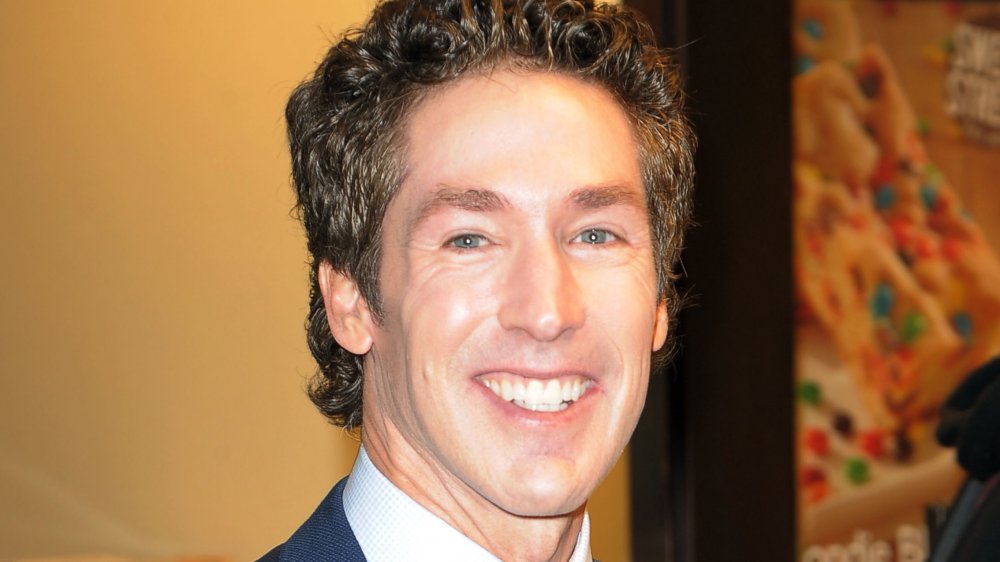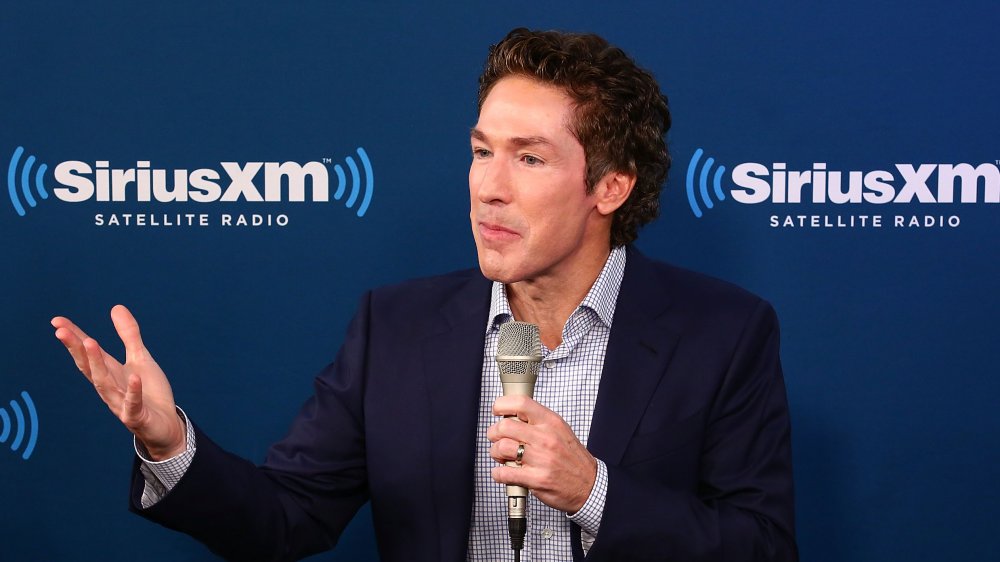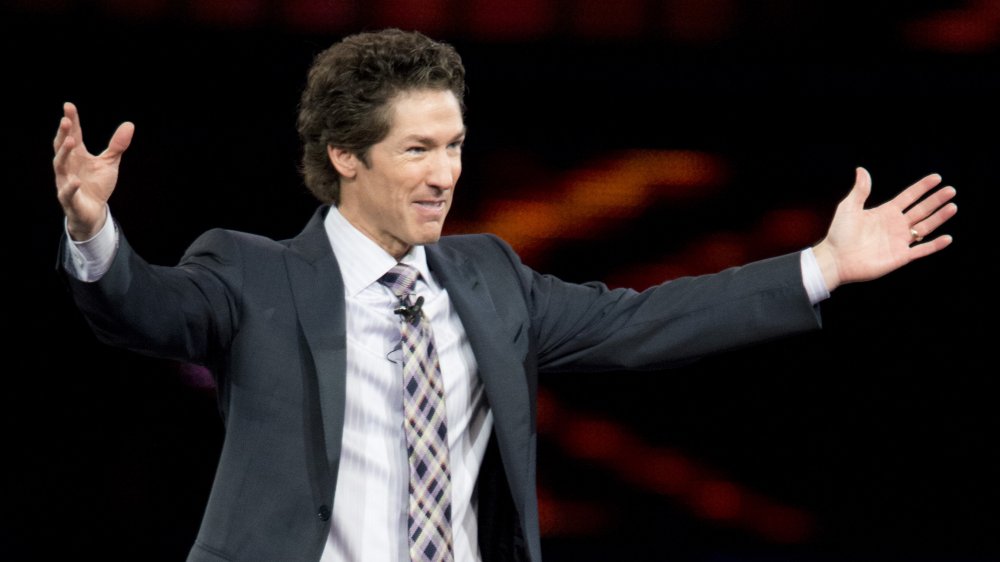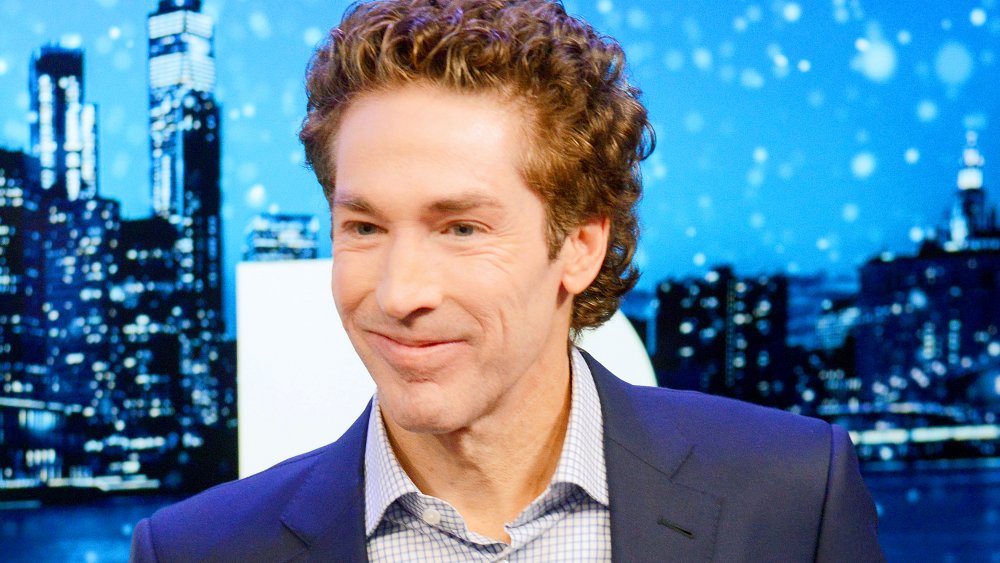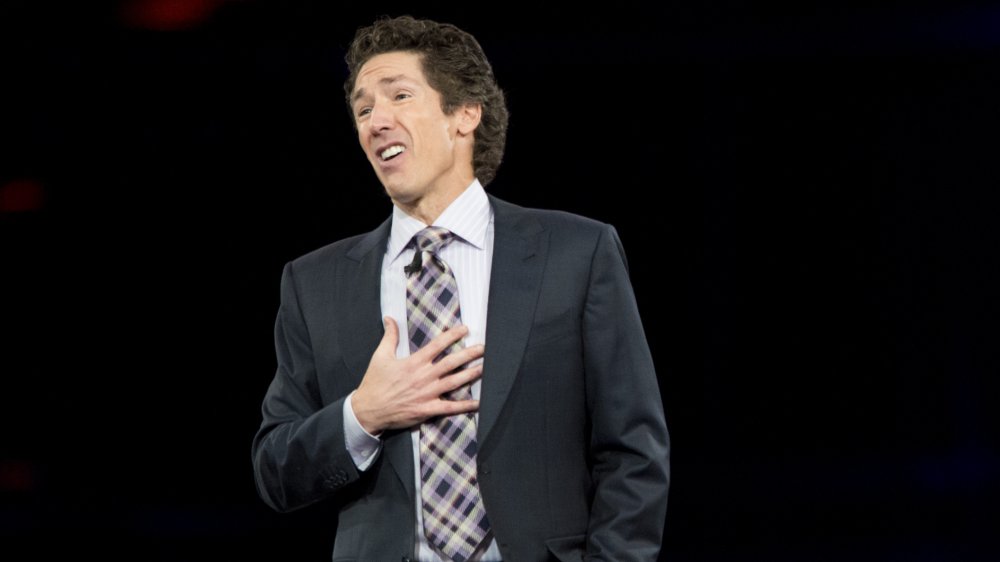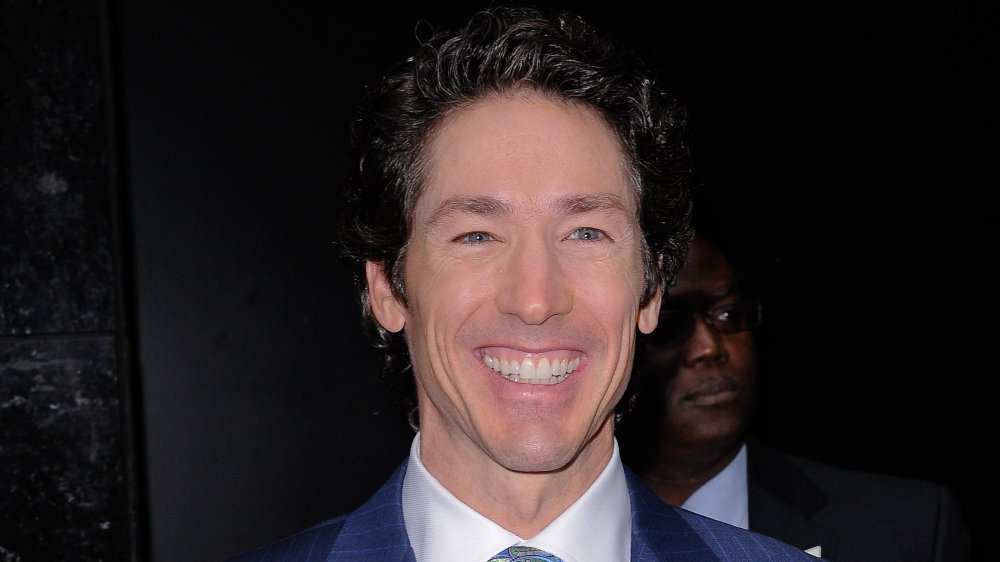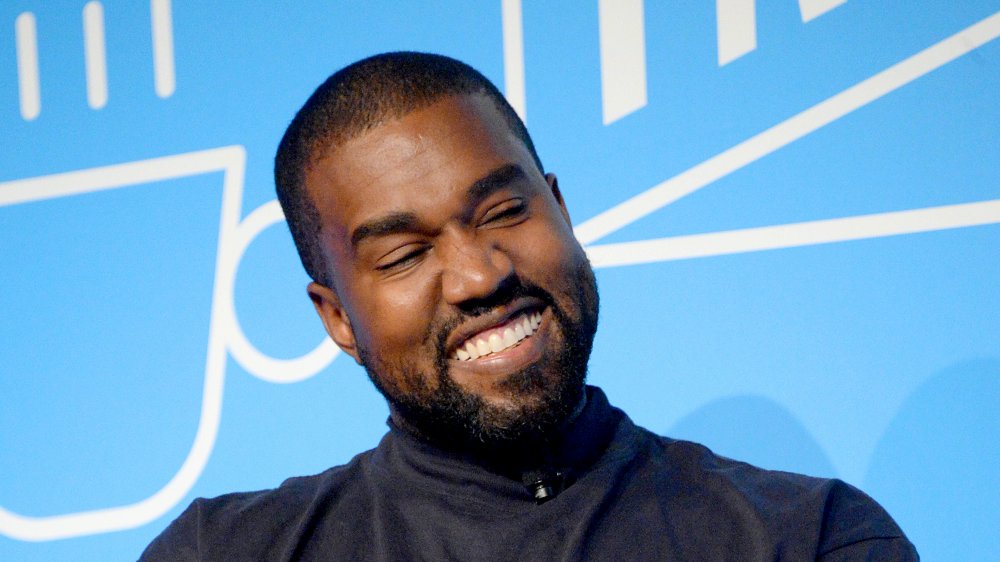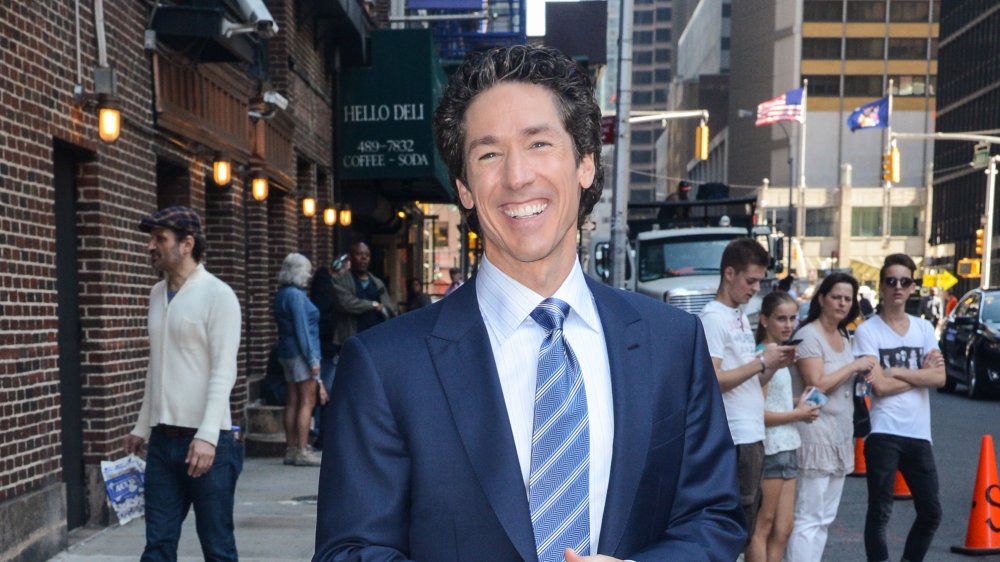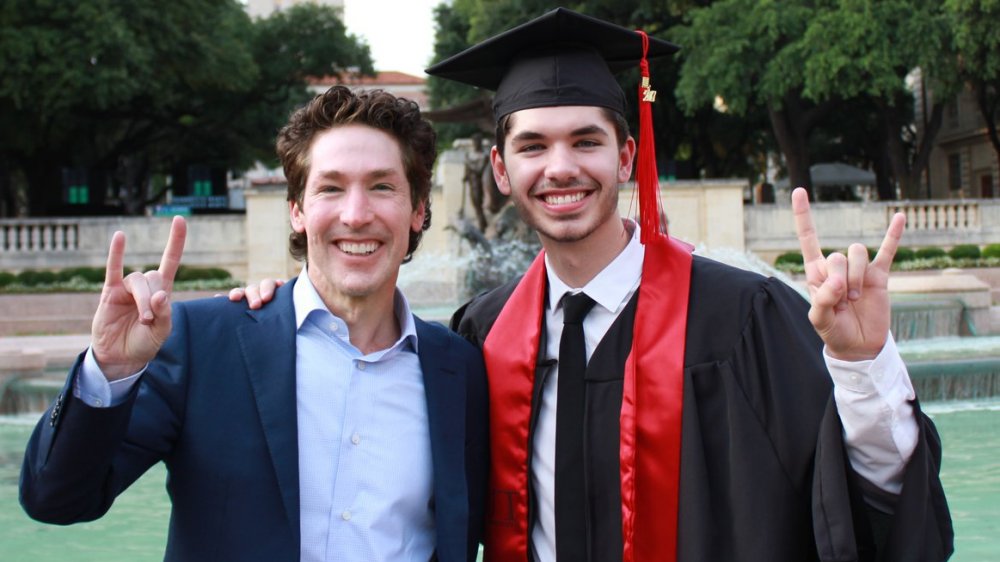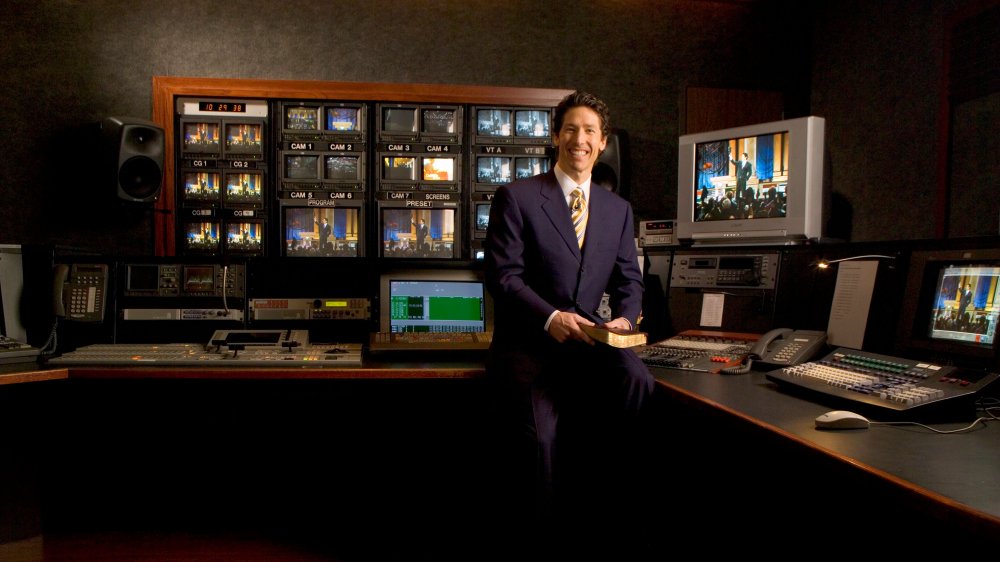The Troubled History Of Joel Osteen
Churches have always been tasked with bringing the word of God to the masses. Megachurches are the logical endpoint of that line of thought, and there are few churches more mega than Joel Osteen's Lakewood Church. As the Indianapolis Star tells us, Osteen is a charismatic televangelist who took over the non-denominational Lakewood Church in Houston, Texas, from his father, John. Young Joel was initially reluctant to join the family business, but his Southern Baptist dad managed to persuade him to give preaching a go in 1999 ... and passed away just six days later, leaving Osteen in charge.
And take charge he did. By 2003, Lakewood Church moved its operations to the Compaq Center, the former home of Houston Rockets. The massive arena church started hosting televised services, through which Osteen reaches millions of viewers on a weekly basis. These days, Lakewood Church boasts over 40,000 members. Osteen also tours the nation with his "A Night of Hope" worship events, and has written several best-selling books.
Now, the world has seen more than its share of televangelists who have been anything but holy. Compared to some of them, Osteen has managed to keep himself relatively free of scandals and suspicious antics. However, this doesn't mean that everyone considers him to be squeaky clean. Osteen certainly has plenty of critics, who have been quick to point out that the powerful preacher man is not without his controversies. Today, we'll take a look at the troubled history of Joel Osteen.
Joel Osteen's lukewarm Neo-Nazi commentary
It's easy to assume that condemning neo-Nazis would be the easiest possible thing for a person to do, especially when said person is a prominent religious leader who very pointedly preaches a message of hope and love. However, reality is often stranger and more disappointing.
As the BBC reminds us, the August 2017 white supremacist rally in Charlottesville, Virginia was a terrifying, hostile event where brawls erupted between the far-right marchers and the counter-protesters. The situation ended in tragedy when a car drove in a crowd of people opposing the neo-Nazis, killing one person and injuring 19 others. Several more were injured in the various clashes during the event. According to the Christian Post, many religious leaders were quick to condemn the white supremacists' actions. Joel Osteen, on the other hand, chose a different route. He initially remained quiet, but once this approach started drawing criticism, he explained his views in a Facebook post that, to many, was no better than his initial silence: "One of the biggest challenges we all face is getting along with people because everyone is different," he stated. "We have different personalities, different temperaments." He then went on to explain that just because someone's doing something wrong "doesn't mean you have to engage."
Unsurprisingly, Osteen's pacifist "be the bigger person" rhetoric didn't go over too well, and many people reportedly felt that he was essentially comparing violent racism to a simple personal conflict or argument.
Joel Osteen kept his megachurch shut to Hurricane Harvey victims until people noticed
In late August 2017, the Houston area was thoroughly wrecked by Hurricane Harvey. As World Vision tells us, the disaster directly and indirectly killed an estimated 103 people, flooded a third of the USA's fourth-largest city, and caused roughly $125 billion in damage. It was a difficult time for the area, and like any good religious leader, Joel Osteen had some words of wisdom and solace to offer. "Jesus promises us peace that passes understanding," the preacher wrote on Twitter. "That's peace when it doesn't make sense."
There was just one minor problem. As the New York Post points out, Osteen had plenty more to give than just social media platitudes. Namely, the Lakewood Church, a 16,800-seat arena-turned-megachurch that was very near to downtown Houston, and could easily be used to house a significant portion of the many Houstonians in need of a temporary shelter. Several people immediately pointed out that Osteen's giant facility hadn't opened its doors to the many people in need, despite the fact that it appeared to be undamaged by the flood. As entertainment publicist Danny Deraney put it on Twitter: "OPEN YOUR CHURCH! You have taken so much money away from your people to live like a king. It's the least you could do." Others echoed the sentiment, and as Bustle notes, Osteen's closed church was soon the subject of an incredibly unflattering online meme.
Joel Osteen's post-hurricane PR disaster
Joel Osteen ultimately opened the Lakewood Church for the victims of Hurricane Harvey, but as CNN reports, the whole thing was a huge PR nightmare. Soon after people called him out for not immediately offering sanctuary in his house of worship, Osteen tweeted: "Victoria and I care deeply about our fellow Houstonians. Lakewood's doors are open and we are receiving anyone who needs shelter."
Unfortunately, the Lakewood Church had already given a torrent of reasons for keeping its doors closed. They'd said that the building was "inaccessible due to severe flooding." They'd also stated that they were not so much closed as they were "prepared to shelter people once the cities and county shelters reach capacity." While the comments were backed up by photos that showed flood water in parts of the facility, the situation didn't exactly make Osteen look good. A columnist on CNN blasted the televangelist's "Harvey excuses" as "bogus," and sites like the Inquisitr and TMZ openly questioned the veracity of the church's flooding claims.
Joel Osteen himself quite naturally took the brunt of the bad PR storm, but soon addressed the situation. In an interview with Today, he explained that apart from safety concerns, the city hadn't asked the church to become a shelter, so they didn't immediately have the resources to start helping scores of people. In his first service after the disaster, he also advised the victims of the hurricane to forget their "'poor old me' mentality."
Here's the church, but what's its message?
As CBS News tells us, Joel Osteen's Lakewood Church in Houston is comfortably the biggest megachurch in America, with an estimated 43,500 weekly visitors as of 2018. Knowing this, it's easy to believe that Osteen's religious message is particularly strong and comforting. According to the Lakewood Church website, Joel Osteen's massive church indeed bases its beliefs "on the authority of Scripture," and its central tenet is that "the entire Bible is inspired by God and without error."
However, according to the Houston Chronicle, Osteen doesn't actually refer to the fundamental matters of religion all that much. His self-admitted style is that of an "encourager," and he rarely dwells on Christianity's many mysteries and controversies. Instead, he pitches a creed that tells people to ignore the bad things in life and to focus on the good. "God wouldn't have allowed it if it was going to keep you from your destiny," he has stated in one of his sermons. "Shake off a victim mentality, and have a victor mentality."
This motivational speaker manner doesn't sit too well with some of Osteen's critics. Pete Evans, a private investigator specializing in church misconduct, has a pretty clear opinion of the substance behind the Lakewood Church pastor's message. "He's a pitch man, selling congeniality and empty promises in the name of God," Evans says. "All you get is an empty box of hope for a better life someday."
Joel Osteen's earthly possessions sure are heavenly
Since he's a televangelist and the head of a sizable megachurch, it's easy to believe that Joel Osteen has a fairly glorious bank account at his disposal. Wealth estimation site Celebrity Net Worth guesstimates Osteen's net worth at no less than $100 million, while the Financial Times goes with a rather more conservative $60 million. It's still an immeasurable pile of dough by almost any standard, especially that of a man of God.
As the Houston Chronicle reports, Osteen's wealth has drawn criticism from scholars and watchdogs groups. Carl Trueman, professor of church history at the Westminster Theological Seminary in Pennsylvania and a pastor himself, doesn't hide his opinion that Osteen's pockets seem to be a little on the deep side for a preacher. "There's always the question of how much money is too much for a pastor to earn," Trueman says. "When you're looking at his lavish private lifestyle, I'd say that's too much."
Osteen's lifestyle indeed seems luxurious, judging by the way he and his wife Victoria reportedly live in a 17,000 square foot mansion with a reported value of $10.7 or $12 million, depending on the source. To be fair, while some scholars think he's way out of line with his personal possessions, there's no evidence that he's misappropriating church funds. In fact, Pete Harris, private investigator and 20-year veteran of church misconduct investigations, specifically says that Osteen "stays on the right side of the law."
Joel Osteen's marketing and book-selling antics
The bulk of Joel Osteen's personal income comes from his books, and as the Houston Chronicle tells us, he is a highly talented marketing machine. When he's on his home turf at the Lakewood Church, he doesn't solicit donations or promote his books all that much.
However, he has a traveling sermon event called the "Night of Hope," and when he takes it on the road, the gloves go off. The admission fee is $15 per person, but that's just the beginning. Tables are stacked with books and merchandise that ranges from clothes and tote bags to journals and audio tapes. Special prizes are available to those who pledge enough money, and donation requests and advertisements for Osteen-themed radio channels, social media, and even apps are everywhere. Osteen often has book signing events in the same cities where the "Night of Hope" takes place, and though the two events aren't marketed together, his involvement in one tends to drum hype for the other, and there's plenty of follower overlap.
The "Night of Hope" events themselves aren't necessarily huge moneymakers, as they actually turned a loss in 2017. However, Blunt says this is covered from the church's budget, which comes largely from donations — and Osteen still gets a huge amount of exposure, which translates to personal benefit through book sales. This is no small backwoods business, either. As of 2018, Osteen had preached to a sold-out Madison Square Garden no less than seven times.
Joel Osteen meets Kanye West
In recent years, any famous person with a public affinity for religion has run a considerable risk of running into Kanye West, a man who's been so very much into religion lately that he once painted himself silver and put together a nativity-themed boat opera. He's also fond of religious events he calls his Sunday Services, and as the Los Angeles Times tells us, in November 2019 he took the stage at Joel Osteen's Lakewood Church in this capacity. What happened for the next 20 minutes was ... markedly different from your average sermon.
West, who the CNN notes has battled mental health issues in the past, acted as Osteen's special guest. Playing the part of an interviewer, Osteen asked West questions about his work, youth, and relationship with the divine. The artist answered like only Kanye West can: in a stream-of-consciousness style that seemed to cast West himself in a borderline prophetic role, waging war against the devil and acting as God's mouthpiece, letting "God flow through him" throughout the event. He said that the devil has stolen all the good musical artists, but fortunately, "the greatest artist that God has ever created is now working for him." He also claimed that his song "Closed on Sunday" is the "hardest record ever made" ... and because things weren't peculiar enough, he then started claiming that strip clubs promote sex trafficking, and that Christians are "beaten into submission" by the society at large.
Joel Osteen and the prosperity gospel
Joel Osteen has been criticized for preaching the "prosperity gospel," per the Financial Times, VOX, and the Indianapolis Star. The term refers to a school of preaching that focuses heavily on the notion that if you're devout enough, God will reward you with wealth and health. The prosperity gospel was made infamous by equally infamous televangelists like Tammy Faye and Jim Bakker, and many see it as a cynical way to lure in weak and poor supporters with promises of faith-delivered riches. It doesn't help that tithing (giving a part of your income to the church on a regular basis) is often involved. According to the Financial Times, several of Lakewood Church's devout members do this.
Osteen's website has stated that "as children of God, we are overcomers and more than conquerors and God intends for each of us to experience the abundant life he has in store for us." Some might indeed think this sounds like classic prosperity gospel-ing. Nevertheless, Osteen himself is quick to distance himself from the sort of televangelist who asks for handouts. In a 2012 interview with Oprah Winfrey, he said: "I'm not asking for money on television. I don't try to be slick, I just try to be sincere. I just try to be who we are."
Joel Osteen flipped the horns
Joel Osteen is a convincing, charismatic presence, whose public persona is smiling, suave and immaculately dressed. It's quite difficult to imagine the pastor committing any sort of social blunder. Yet, as the Christian Post tells us, some of his fans felt that's exactly what happened in 2017, when his son Jonathan graduated from the University of Texas.
The University of Texas at Austin is famous for its Longhorns football team, which in turn is famous for the Hook 'em Horns. This traditional Longhorn hand signal is common at the University, but it also bears a considerable resemblance to the devil horns gesture, as popularized by legendary metal vocalist Ronnie James Dio. And so it came to be that the two generations of Osteens posed for a picture while flashing the Hook 'em Horns. As CBS Austin tells us, when the televangelist posted the image on Twitter, people immediately started accusing him of using the devil sign, with some suggesting that he should've used a more befitting sign, such as plain, old thumbs-up. Ironically enough, the Austin American-Statesman (via Christian Today) notes that a thumbs-up at the University of Texas would probably have gone down a lot worse than the horns sign, seeing as it's the sign of the Texas A&M University, a traditional rival of the Longhorns.
Fortunately for Osteen, this particular faux pas has so far failed to topple the Lakewood Church.
The Lakewood Church safety seat incident
When your organization is large enough, there's always the chance that someone working there gets involved in some problematic business, and when you're the face of the organization, it's suddenly very much your problem. According to Click 2 Houston, this was the case for Joel Osteen and the Lakewood Church when the pastor found himself attached to an unfortunate lawsuit by a family who claimed that their 18-month-old daughter was injured during a church service in May 2014. According to the lawsuit, the family was sitting on the church pew, when, suddenly, a representative of the church "grabbed a child safety seat with [their] daughter in it and threw the seat off the church pew. The child landed face first on the floor." The fall was said to have injured the girl rather seriously, while the family said the incident traumatized them so badly that they actually ended up leaving Texas.
Since the church representative was only named as "Joe Doe" in the lawsuit, Osteen was the guy the lawsuit mentioned by name. The Lakewood Church said that there were no witnesses to back up the family's story, and that they considered the whole thing to be a lie. Nevertheless, Radar Online reports that in 2016, the church ended up settling the case for $15,000.
